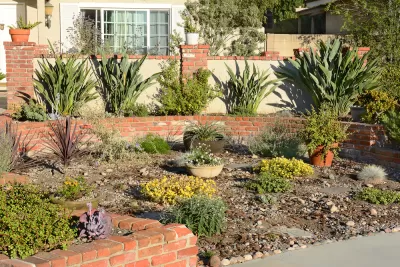Curbed surveyed landscape architects specializing in drought-resistant lawns for their best "tips and tricks."

Residents of the United States raise 40 million acres of turf grass crops every year, more than any other crop. Some, in areas where water is expensive or scarce, are looking to modify their lawns and gardens by planting less water-intensive plants.
Like any project where one diverges from the standard way of doing things, the process can seem intimidating. In an article for Curbed, Kate Losse spoke with landscape architects in drought-plagued Southern California to get their insights into handling this issue. Among other suggestions, they advised that anyone intending to change their outdoor space budget time for research into both their specific lawn and the plants that might flourish there. Losse was also told that no garden is a set it and forget it proposition. "Experts caution that just because a garden is drought-tolerant, doesn’t mean it doesn’t need attention, and that paying attention to your garden and its needs is a crucial element to its growth," the Curbed piece reports.
There have certainly been misadventures in reducing water use in gardens, but the Curbed piece aims to show how the project can be managed to fit the climate and the ambition of the gardener.
FULL STORY: Drought-tolerant gardens: Expert tips and tricks

Maui's Vacation Rental Debate Turns Ugly
Verbal attacks, misinformation campaigns and fistfights plague a high-stakes debate to convert thousands of vacation rentals into long-term housing.

Planetizen Federal Action Tracker
A weekly monitor of how Trump’s orders and actions are impacting planners and planning in America.

In Urban Planning, AI Prompting Could be the New Design Thinking
Creativity has long been key to great urban design. What if we see AI as our new creative partner?

King County Supportive Housing Program Offers Hope for Unhoused Residents
The county is taking a ‘Housing First’ approach that prioritizes getting people into housing, then offering wraparound supportive services.

Researchers Use AI to Get Clearer Picture of US Housing
Analysts are using artificial intelligence to supercharge their research by allowing them to comb through data faster. Though these AI tools can be error prone, they save time and housing researchers are optimistic about the future.

Making Shared Micromobility More Inclusive
Cities and shared mobility system operators can do more to include people with disabilities in planning and operations, per a new report.
Urban Design for Planners 1: Software Tools
This six-course series explores essential urban design concepts using open source software and equips planners with the tools they need to participate fully in the urban design process.
Planning for Universal Design
Learn the tools for implementing Universal Design in planning regulations.
planning NEXT
Appalachian Highlands Housing Partners
Mpact (founded as Rail~Volution)
City of Camden Redevelopment Agency
City of Astoria
City of Portland
City of Laramie





























